You're away from FREE US delivery Free US delivery (applied at checkout) on orders over $60.00
You have qualified for Free US delivery
Health News
Gut Feelings: The Most Searched Gut Problems in the USA
The Most Searched Gut Issues in Every State (and How to Solve Them)
The digestive system is an incredibly complex and delicate part of the body, easily impacted by such day-to-day choices as food and drink intake. Whether suffering from occasional bouts of food poisoning or dealing with the symptoms of lactose intolerance, many of us can relate. In fact, it is estimated that 60 to 70 million people in the US suffer with at least one recognized digestive issue.
In a world of self-diagnosis, where the first point of call for medical advice has understandably become the internet, we have the means to gain insight into the gut issues US citizens are searching for, and most likely to be suffering from. From symptoms to diseases, the US is paging Dr. Google.
Using Google Trends data, the team at Optibac have conducted a deep dive to find out exactly which gut issues and symptoms relating to the digestive system are affecting the residents of each state, with the findings mapped below;
The top gut issues in every state
Taking 10 common gut issues, we have found which issue each state is searching for the most.
Food poisoning emerged as the most commonly searched gut issue in more than one-fifth of US States. We have all been there, falling ill the day after trying out a new restaurant will understandably send us into a panicked state, hyper fixated on how long before the nausea, vomiting or diarrhea subsides. And it’s more common than you imagine - every year one in six Americans suffers from food poisoning.
The runner-up is GERD, which stands for Gastroesophageal Reflux Disease, and takes the top spot in 11 states, the majority of which are clustered in or around the east coast. It is interesting to note that many of the states surrounding those searching mostly for GERD are searching for mostly for acid reflux the most - an issue that goes hand in hand with GERD.
Which US state is googling gut issues the most?
Our study showed that Vermont looks to Dr. Google for gut advice the most often, taking the top spot with a search score of 835/1000. Vermont peaked at 100 on google trends for three of the gut search terms in the study - Lactose Intolerance, IBS and GERD.
Our expert, Kathy Wheddon (Nutritional Therapist, DipION) analyzed the signature dishes associated with Vermont to see if a connection could be made between the diet of a typical Vermont resident and the gut complaints they are searching for most frequently.
Kathy explains:
“From a culinary point of view, Vermont is famed for its maple syrup and many dairy farms; producing milk and excellent local cheeses. These ingredients are used in most of the region's favorite dishes, such as Mac ‘n cheese, grilled cheese, Sugar on Snow, Creemees, and Maple baked beans. These dishes may be delicious, but they could also be contributing to the region's gut health issues!
“Dairy products contain sugars, such as lactose, that can be difficult for the body to break down. A lack of the digestive enzyme lactase can lead to dairy intolerance, and its associated digestive symptoms (such as bloating). So, in some instances, it may be wise to hold back from the additional cheese curd on those gravy fries, or the Vermont cheddar on apple pie.
“As for the local maple syrup; well sadly this delicacy can also cause digestive symptoms. It may contain more nutrients (minerals and antioxidants) than many other types of sugar as it is less processed. However, in just the same way as refined sugars do, maple syrup can also contribute to dysbiosis in the gut.
“Sugars (of any kind) are the preferred food source for pathogenic strains of bacteria and yeasts and can lead to their overgrowth, whilst also contributing to inflammation. A high sugar diet can therefore be a factor in many gut symptoms, including dysbiosis, candida, and even IBS.”
Acid Reflux is the most commonly searched digestive issue in the US, with over 291,000 google inquiries per month, and our study found a 14% increase in searches during the new year period. Alcohol is known to be a cause of acid reflux, so there’s a chance that festive overindulging might’ve been behind the sudden surge.
Top statewide symptoms
From anxiety to underlying conditions, many factors can have a knock-on effect on the gut. With the cost of healthcare in the US, many people will, understandably, check the internet prior to making any appointments.
As well as being the free option, visiting Dr. Google can also be preferable to those worried about any embarrassing side effects people feel about the symptoms of their gut issues. Of the gut-related symptoms analyzed in our study, constipation came out as the most searched symptom in the US, with 30% of states searching for the symptom more than any other.
When looking at the number of symptom searches, diarrhea takes the top spot, with 390,000 searches in the US alone and 852,000 searches globally per month.
Stomach gas, or gas as it's more widely referred to, is also an incredibly common gut issue (2900 searches per month in the US alone).
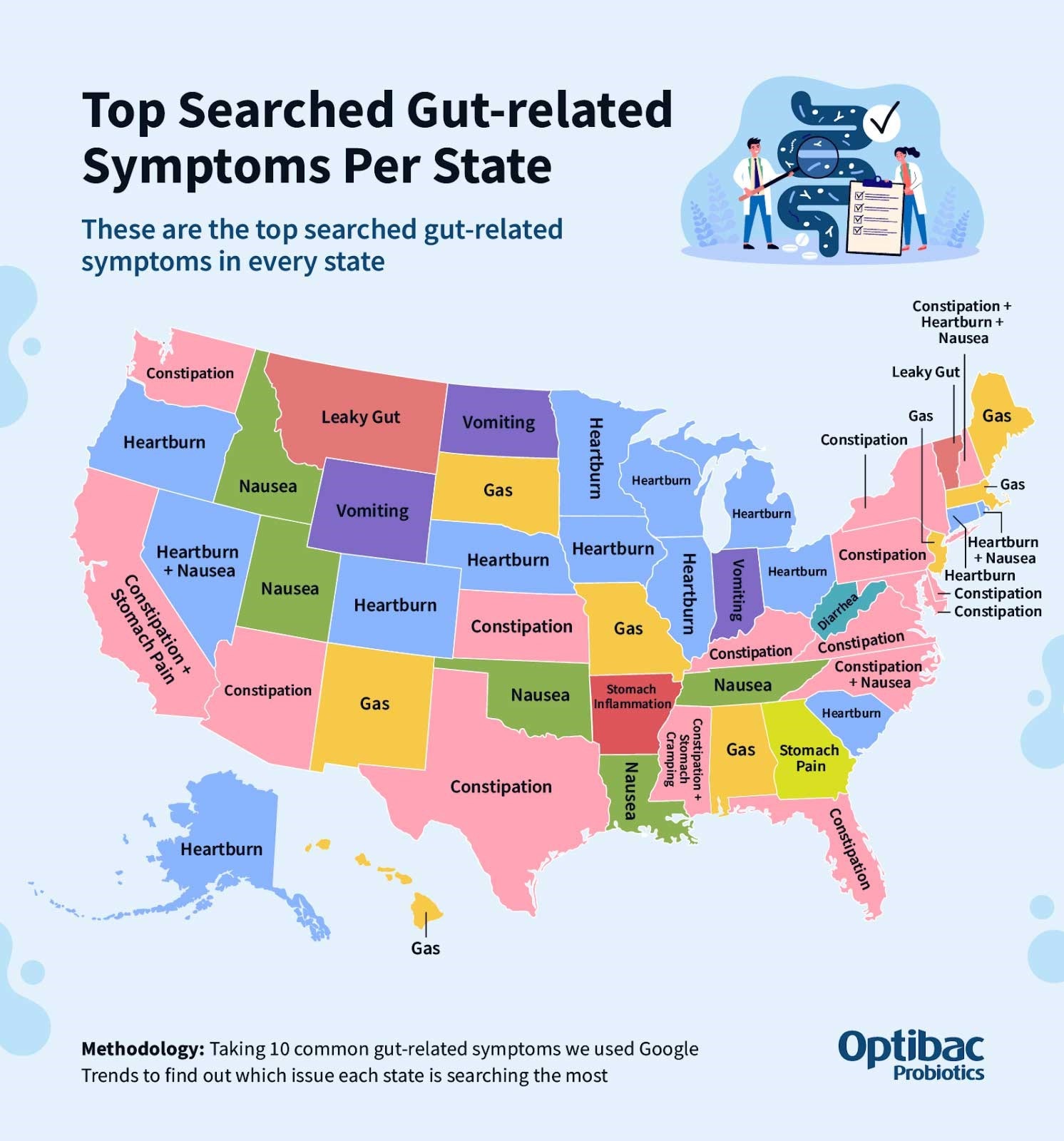
But what are the biggest causes of stomach gas? Usually, it’s our diet.
The gut-health specialists at Optibac discovered some interesting seasonal patterns when it comes to gut issues. In the period surrounding Thanksgiving, searches for stomach gas rose by more than 14% compared to the rest of the year.
This was not the only surge pattern the study found, as searches for vomiting also increased by more than 11% around New Year’s and lactose intolerance a whopping 23% around Independence Day. The Thanksgiving meal is filled with ingredients that would set off a lactose-intolerant stomach e.g. creamy mash, green bean casserole, and chocolatey desserts. This could also be linked to spending time with family and friends over the holidays and catering to those with different dietary needs.
The top state searching for both food poisoning and acid reflux was Alabama, which also emerged as the state searching for the most gut-related symptoms in the US, with a score of 837/1000.
Alabama scored highly across the board when it came to a range of symptoms, but particularly high for stomach gas where it generated a score of 100/100. We also found a study by Datafiniti crowning Alabama the state with the most restaurants (6.3 restaurants per capita) - and this culinary link to the state may not be a coincidence when it comes to digestive complaints, as our expert, Kathy Wheddon, explains below:
“Alabama is particularly well known for its fried foods, including fried chicken, country fried steak, fried green tomatoes, fried okra, and fried catfish. Considering then that fried food is particularly hard on our digestion, it is perhaps little wonder that the state fares badly when it comes to its residents’ gut health.
“Fried foods are often cooked in oils that are rich in saturated fats and trans fats which can irritate the stomach, causing gas, bloating, diarrhea, and other symptoms. Additionally, fried food is thought to promote the growth of harmful gut bacteria.
“On top of a love of fried food, Alabama is also renowned for its desserts, such as pecan pie, peach cobbler, and banana pudding. Sugar is the favored food source for many gut pathogens, and can therefore tip the balance of gut microbes towards less desirable organisms, creating dysbiosis.
“Gut dysbiosis can cause many uncomfortable symptoms, including bloating, gas and constipation.”
The most gut-concerned states, ranked
The tables below show the top 20 states across the USA that have the most ‘gut feelings’, aka the states with the highest search volume of (1) gut issues and (2) symptoms:
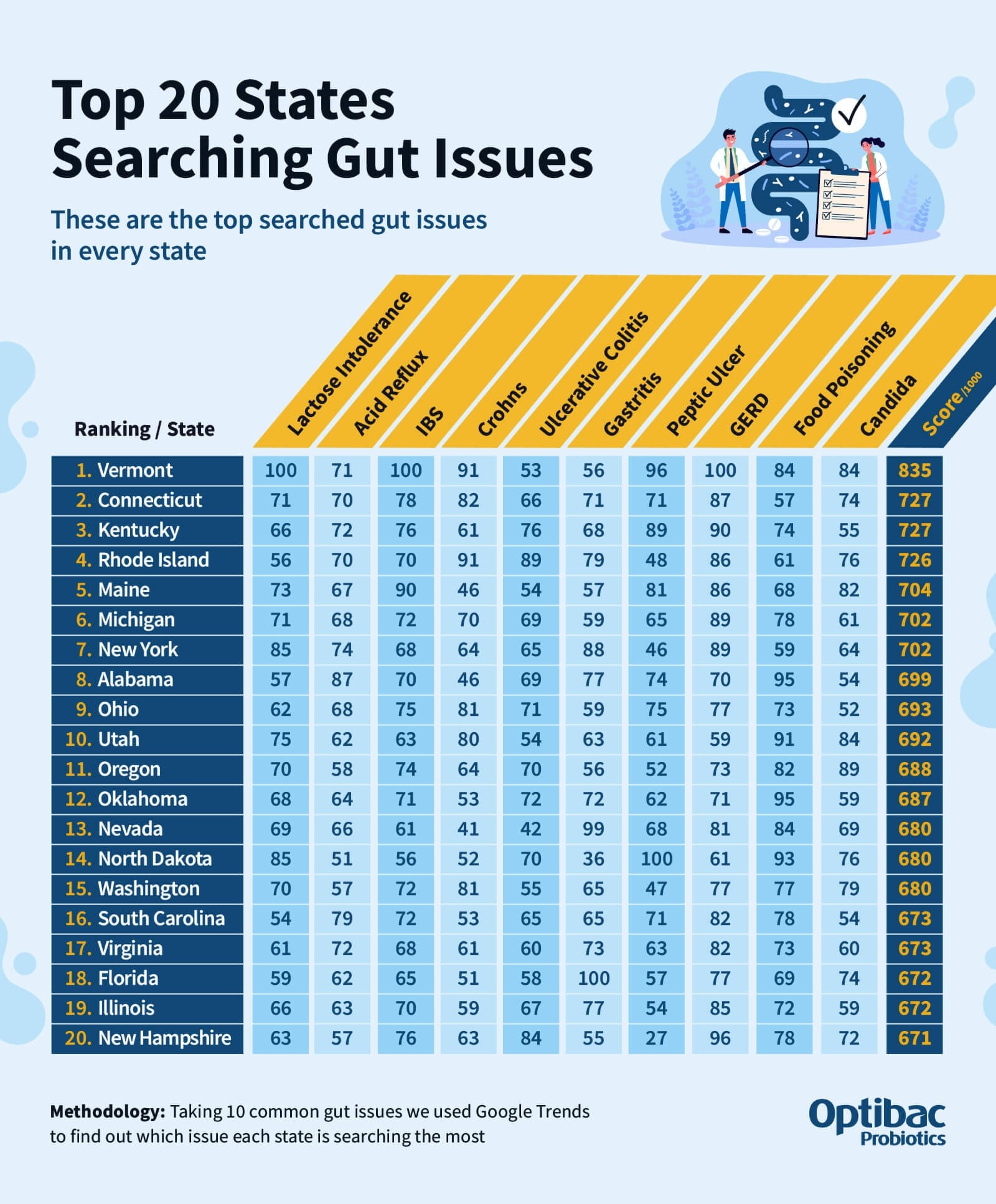
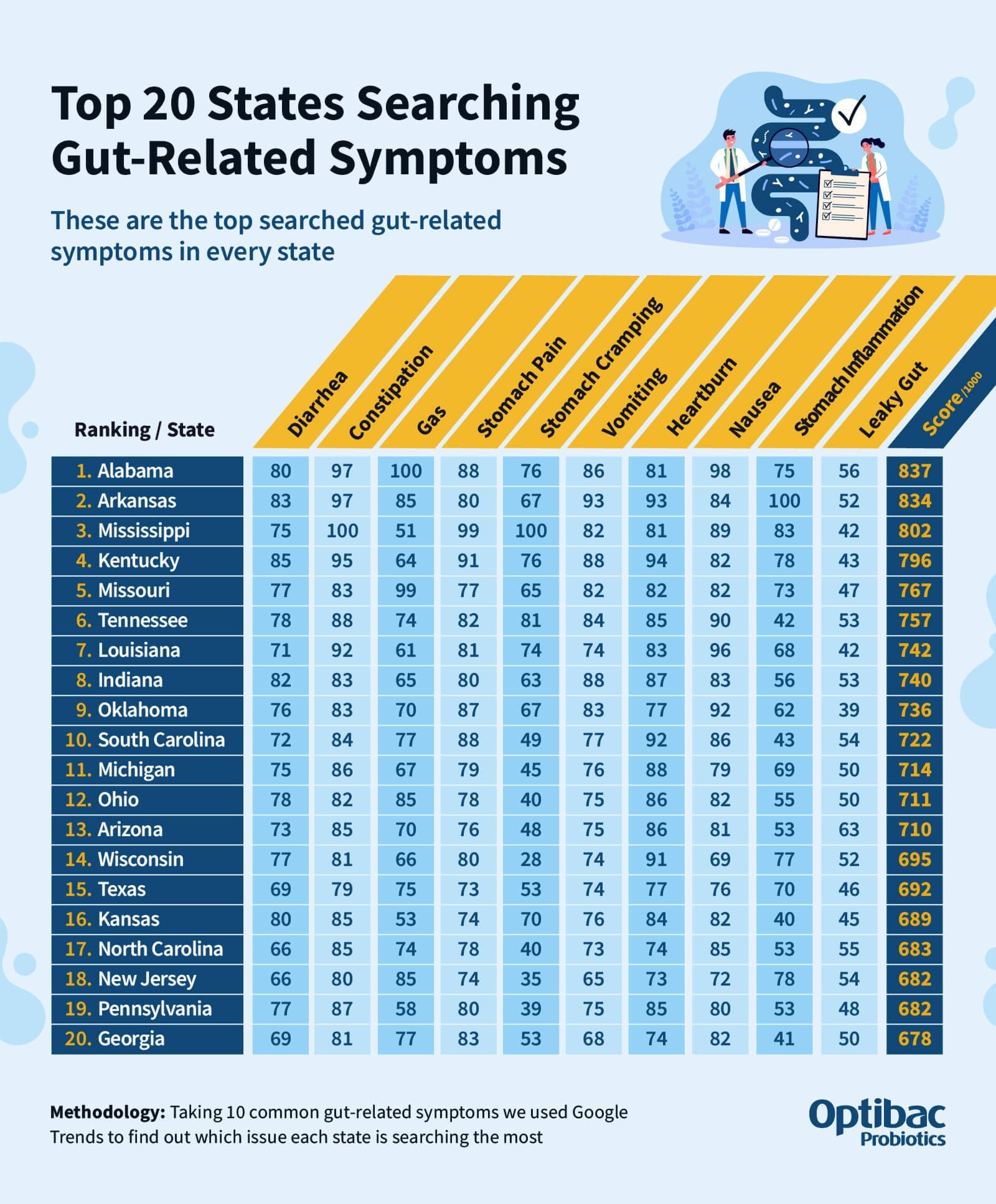
Top 5 Most Searched Gut Issues in the US - What can be done to help?
Time to get into the expertise. We have taken the top 5 most highly searched gut issues in the US each month, and asked our experts to explain each issue and offer insight on what can be done to help ease the symptoms that accompany each.
The following advice is from Kerry Beeson, an expert in gut health at Optibac.
1. GERD
Searches per month: 284,000
Top state: Hawaii/Alabama
Symptoms: Stomach pain/inflammation, heartburn, nausea, and vomiting
What is it and how can you help ease the symptoms?
“Acid reflux is a condition in which the acidic contents of the stomach leak back up your esophagus. When this occurs regularly, it’s known as gastroesophageal reflux disease or GERD.“
“It can be triggered by many factors including stress, smoking, certain foods or drinks, medications, hiatus hernia, stomach ulcer, H. pylori bacterial infection, low stomach acid, constipation, physically bending over, and being overweight.“
“Poor gut health can contribute too: sometimes acid reflux symptoms are associated with an imbalance in the gut bacteria in the small and large intestines.“
“This is where probiotics can be useful to help balance the gut microbiome, and also help to improve digestion and sluggish bowels.” Additionally, certain probiotic strains such as Lactobacillus acidophilus/helveticus Rosell-52 and Saccharomyces boulardii have been shown to combat H. pylori infections”
2. Ulcerative Colitis
Searches per month: 257,000
Top state: California
Symptoms: diarrhea, constipation, gas, stomach pain/cramping, nausea, inflammation
What is it and how can you help ease the symptoms?
“Ulcerative Colitis (UC) is very similar to Crohn's Disease as both are inflammatory bowel disorders. They share some similarities in symptoms, but the defining difference is the location of the ulceration and/or inflammation and tissue damage. The symptoms in both can be aggravated by dietary factors or stress but they are now both considered to be auto-immune disorders.
Many people find probiotics helpful in managing the symptoms, but they should not be taken without a doctor’s advice if blood is present in the stool, or if medication is being taken which affects the functioning of the immune system. Saccharomyces boulardii has shown promise for management protocols inflammatory bowel disease2,3. It has been shown to modulate inflammation in the gut by increasing levels of secretory IgA4, a substance that helps to heal the gut lining. S. boulardii is also popular with IBD sufferers as it can help to manage loose stools/diarrhoea5, often a problematic and common symptom.”
3. Gastritis
Searches per month: 240,000
Top state: California
Symptoms: gas, stomach pain, heartburn, nausea, stomach Inflammation
What is it and how can you help ease the symptoms?
“Gastritis occurs when the lining of the stomach becomes inflamed. This can be caused by a variety of factors including an H. pylori bacterial infection, long-term use of non-steroidal anti-inflammatory medications, alcohol or recreational drugs use, alcohol, smoking, stress, or surgery. Many of these factors also negatively affect the gut microbiome so sufferers may develop other digestive disorders.
Probiotics don’t colonize in the stomach but can help to maintain and support overall gut health. They may be useful if the gastritis is caused or aggravated by the pathogenic bacterium Helicobacter pylori. Lactobacillus acidophilus/helveticus Rosell-52 and Saccharomyces boulardii have been shown to combat H. pylori infections5.”
4. Food Poisoning
Searches per month: 159,000
Top state: Alabama
Symptoms: diarrhea, nausea, stomach pain/cramping, gas, and vomiting
What is it and how can you help ease the symptoms?
“Most cases of food poisoning are caused by foods contaminated with bacteria such as Salmonella or Escherichia coli (E. coli), or viruses, such as the norovirus. Keeping a healthy gut microbiome is believed to offer some defense against contracting stomach upsets, as the bacteria in a healthy gut microbiome produce by-products such as propionate which discourages bad bacteria from multiplying6.
Once food poisoning is contracted, then certain probiotics may provide some relief from symptoms: Saccharomyces boulardii in particular has a broad anti-pathogenic action. It has a sticky outer surface that attracts pathogens such as Escherichia coli and Salmonella and removes them from the gut. It has been researched extensively for the support of diarrhea symptoms caused by bacteria and viruses.”
5. Lactose Intolerance
Searches per month: 207,000
Top state: Massachusetts
Symptoms: nausea, pain/cramps, gas, and diarrhea
What is it and how can you help ease the symptoms?
“Lactose intolerance is the inability to digest lactose, the predominant sugar found in milk. This inability results from a shortage of the enzyme lactase, which breaks down lactose for easy absorption.
Low lactase levels mean that lactose arrives in the colon undigested, where bacteria break these sugars down, creating excess gas and fluid which can result in stomach cramps and diarrhea. Lactase production can decline in later life, but trying to keep the gut microbiome healthy and full of good bacteria - also known as probiotic bacteria - will hopefully help ease your guts reaction”.
These recommendations are not intended as an alternative to medical advice. All symptoms and the use of natural supplements should be discussed with a doctor.
In the case of all issues and recurring symptoms, we always recommend seeking medical attention.
References
- Guslandi M, Mezzi G, Sorghi M, Testoni PA. Saccharomyces boulardii in maintenance treatment of Crohn's disease. Dig Dis Sci 2000;45: 1462-4 [PubMed]
- Guslandi, M. et al. (2003) A pilot trial of Saccharomyces boulardii in ulcerative colitis. European Journal of Gastroenterology & Hepatology. Vol. 15 pp. 697 – 698.
- Qamar et al., (2001), ‘Saccharomyces boulardii Stimulates Intestinal Immunoglobulin A Immune Response to Clostridium difficile Toxin A in Mice’. Infect. Immun., 69(4):2762–2765.
- McFarland L.V., (2010), ‘Systematic review and meta-analysis of Saccharomyces boulardii in adult patients’. World Journal of Gastroenterology, 16(18):2202–2222
- Bielanski W. et al., (2002), ‘Improvement of anti-Helicobacter pylori therapy by the use of commercially available probiotics’. Gut, 5(11):A98.
- Jacobson A, et al (2018) Gut Commensal-Produced Metabolite Mediates Colonization Resistance to Salmonella Infection. Cell Host Microbe. 2018 Aug 8;24(2):296-307.e7. doi: 10.1016/j.chom.2018.07.002. Epub 2018 Jul 26. PMID: 30057174; PMCID: PMC6223613.
Methodology
- Taking 10 common gut issues and symptoms, we scoured Google Trends and AHREFS to see which issues are being searched the most around the US.
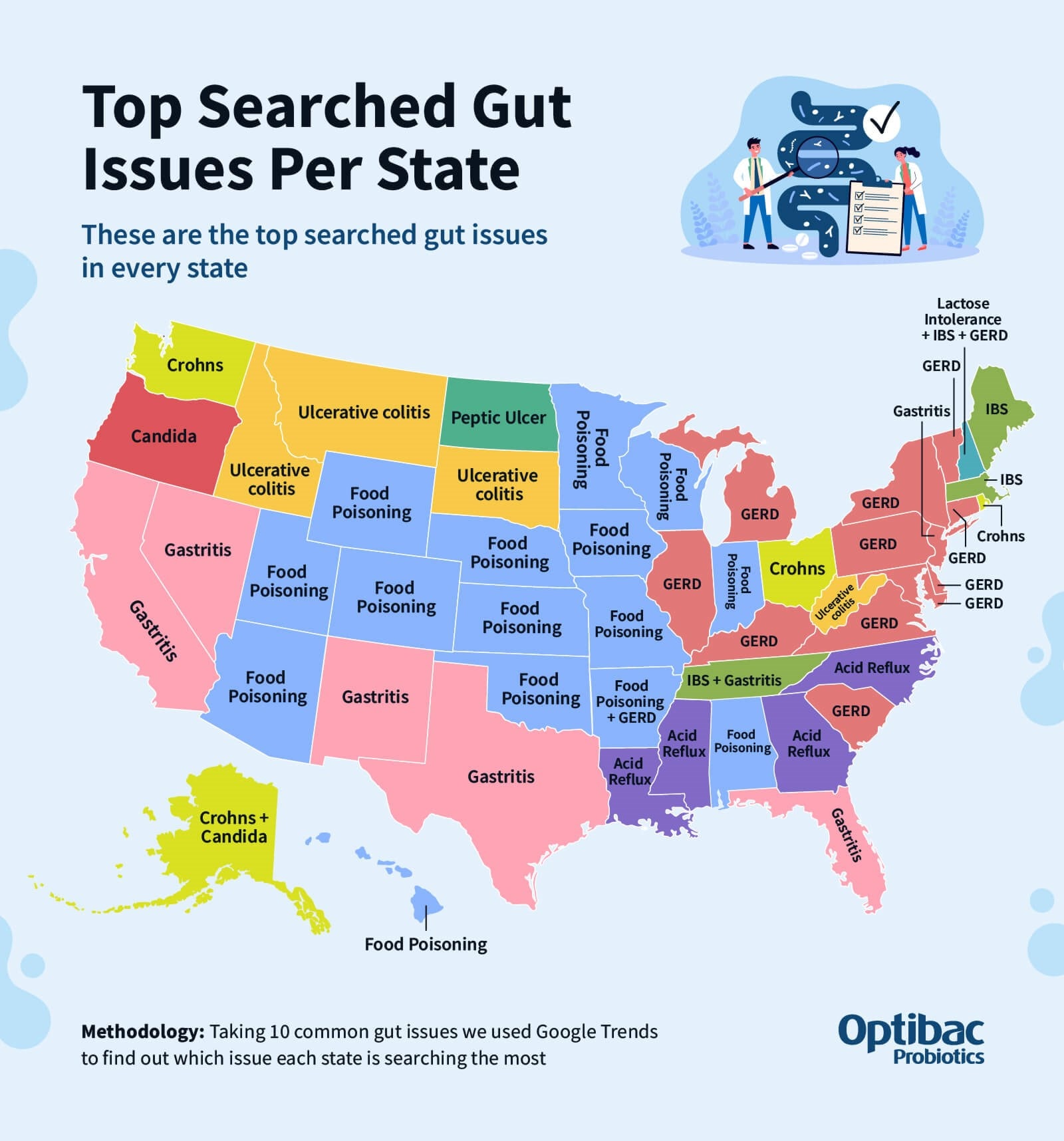
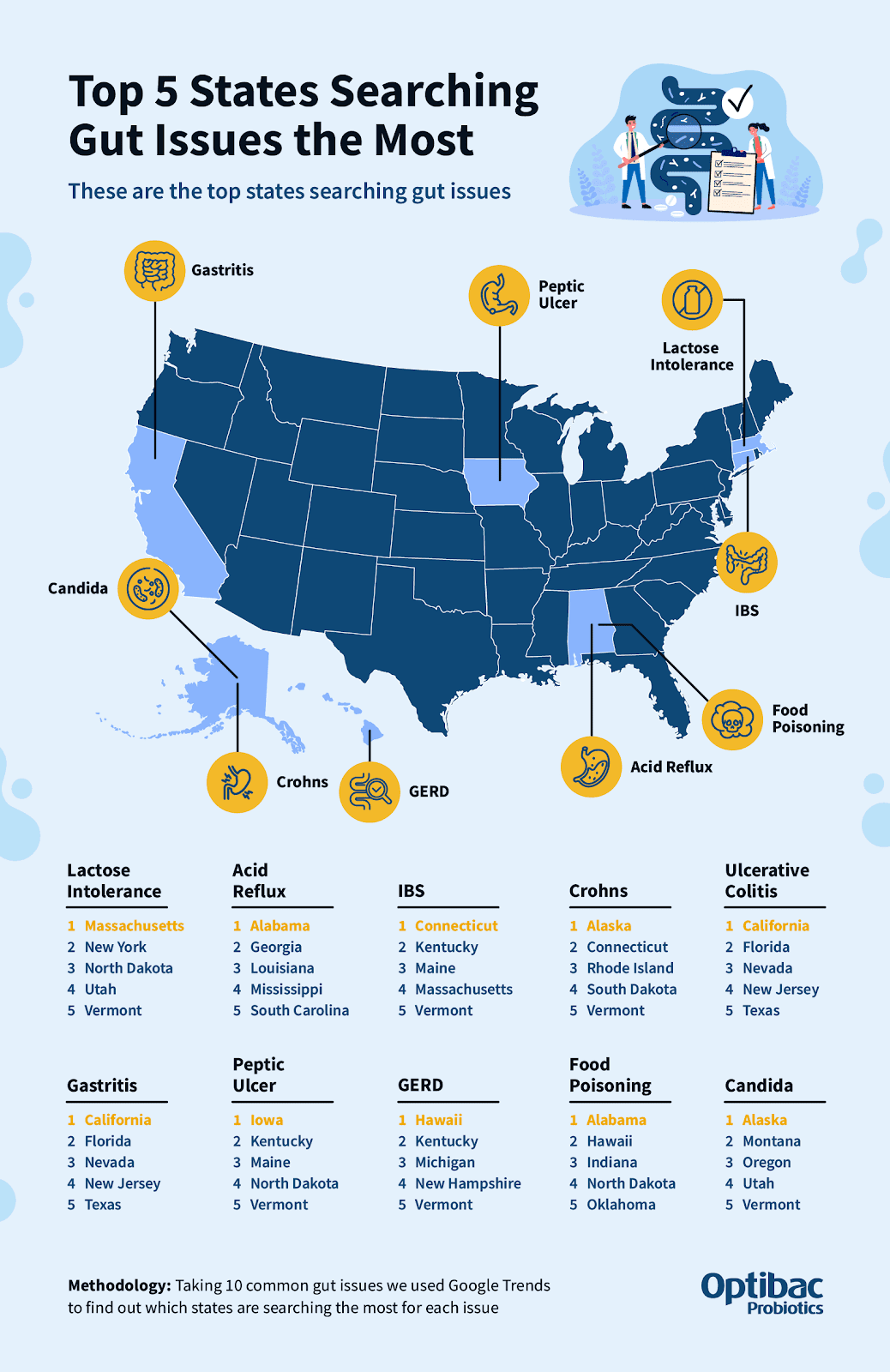
_1.png)